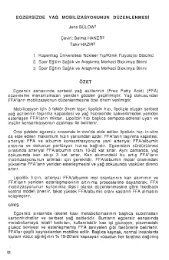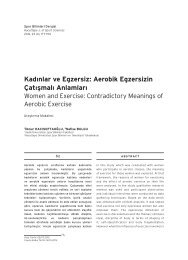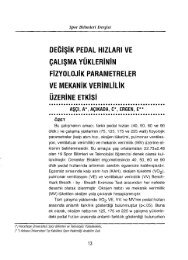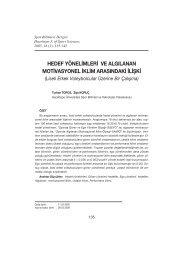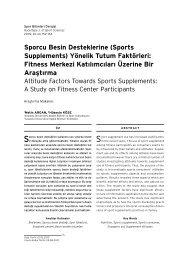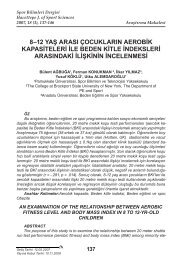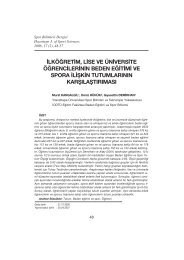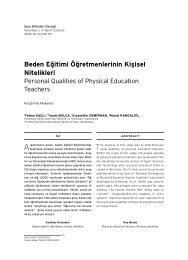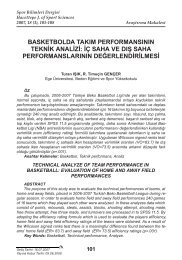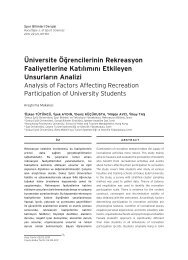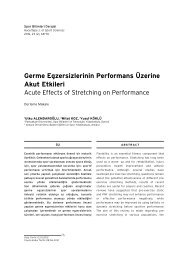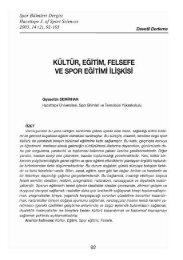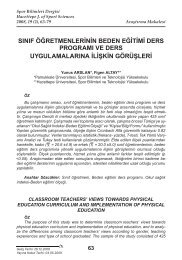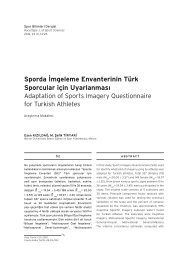EGZERSiZ VE iMMÜN SiSTEM: - Spor Bilimleri Dergisi - Hacettepe ...
EGZERSiZ VE iMMÜN SiSTEM: - Spor Bilimleri Dergisi - Hacettepe ...
EGZERSiZ VE iMMÜN SiSTEM: - Spor Bilimleri Dergisi - Hacettepe ...
You also want an ePaper? Increase the reach of your titles
YUMPU automatically turns print PDFs into web optimized ePapers that Google loves.
Egzersiz, İmmiin Sistem ve Karbonhidrat/ar<br />
EXERCISEAND IMMUNE SYSTEM: EFFECT OF CARBOHYDRATES<br />
ABSTRACT<br />
High-intensity and long duration exercises supress immune system temporarily by inereasing<br />
stress hormones, changing cytokine release and decreasing saliva release. Nutritianal<br />
defficiency is another factor which supresses immune function. Endurance athletes,<br />
such as marathon and ultra-marathon runners are at greater risk due to the supression of<br />
immune system via exercise. As the exercise stress increases and nutritional deficiency becomes<br />
worse they both synergisticaly increases the degree of immunosupression. This corıdition<br />
is common in endurance sports, especialy in female athletes, where nutritional deficiency<br />
is seen frequently. Carbohydrates, which reduce the supression of immune function,<br />
are the most important nutrients for high-intensity and prolonged exercises. Therefore, the<br />
recommended daily intake of carbohydrates is 7-10g/kg body mass for athletes who have<br />
heavy training schedule to ensure that glycogen stores are full before starting a training session<br />
or competion. In additon, athletes are recommended to consume 30-60 9 CHO every<br />
hour during exercise to supply the source of energy for exercise and reduce the immunosupressive<br />
effects of exercise. Carbohydrates reduce the immunosupressive effects of exercise<br />
either directıyor indirectly by supplying energy source for the cells of immune system<br />
and regulating the stress hormones, cytocine production and release of saliva, respectively.<br />
Key Words: Immune system, Exercise, Nutrition, Carbohydrates.<br />
GIRIŞ<br />
<strong>Spor</strong>cuda başarı için optimal performans<br />
hedeflenmekte, sağ/ık kavramını<br />
da içeren bu terim optimal antrenman ve<br />
optimal beslenme terimlerini de beraberinde<br />
getirmektedir (Leutholtz ve Kreider,<br />
2001). Optimal performans için<br />
sporcuda antrenman ve diyet açısından<br />
performansı geliştirici stratejiler oluştururken<br />
sporun doğasından gelen sağlığı<br />
olumsuz etkileyebilecek faktörlerin de<br />
ortadan kaldırılması ve hastalık riskinin<br />
azaltılması gerekir. Bu anlamda egzersizin<br />
sağlığa ve özellikle son 20 yılda immün<br />
sisteme olan etkileri incelemeye<br />
alınmış ve konuya ilişkin pek çok çalışma<br />
yürütülmüştür. Bu çalışmalardan elde<br />
edilen sonuçlar, henüz klinik bağlantısı<br />
tam olarak gösterilememesine karşın,<br />
egzersizin sporcuda akut ve kronik<br />
bir stresör olarak bağışıklık sistemini<br />
baskılayabileceğini ortaya koymuştur.<br />
(Castellani, 2002; Malm, 2004; Nieman,<br />
2003b; Pedersen ve Hoffman-Goetz,<br />
2000; Smith, 2003). Egzersiz nedeniyle<br />
immün sisteminin baskılanmasının kllnikte<br />
infeksiyon hastalıklarının görülme<br />
riskini artırabileceği gibi, egzersize kas<br />
adaptasyonunun değişmesinde ve<br />
substrat oksidasyonunun düzenlenmesinde<br />
de rol oynayabileceği belirtilmektedir<br />
(Maim, 2004).<br />
Beslenme durumunun immün sisteme<br />
etkileri uzun yıllardır bilinmektedir<br />
101



